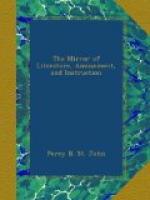To the curious dilettanti in dates, &c. (such as our friend P.T.W. &c.) the following almost coinciding circumstances may not prove uninteresting:—The recent engagement took place on the anniversary of the memorable battle of Salamis, 480 B.C. when the invading army of Xerxes was defeated by the Greeks; and on which day Euripides, the Greek tragic poet, was born: Nestor is said to have been born at Navarino, as we have already mentioned: and, lastly, the attack, of which the subjoined plan is illustrative, was made on the eve of the anniversary of the glorious battle of Trafalgar, in which victory the vice-admiral of Navarino, then captain of the Orient, was engaged.
[Illustration: Plan]
REFERENCES.
1. The English Squadron.
2. French Squadron.
3. Russian Squadron.
4. The combined Turko-Egyptian Fleet.
5. The boat sent by the “Dartmouth” to one of the Turkish Fire Ships, in which Lieutenant G.W.H.F. Fitzroy was killed.
6. and 7. Turkish Fire ships.
The other figures denote the depth of water in English fathoms.
* * * * *
SEASONABLE RELICS.
PART OF AN ANCIENT SONG.
The following is part of an old song which I have faithfully copied; it was, I am told, sung at Wakes in the north of England, and also previous to Christmas: from the appearance, little doubt is left as to its being of northern composition.
I have seen in former volumes of the MIRROR, specimens of two ancient ballads, and as they are a curiosity, I have sent mine as being, I think, equally so. There is an old ballad which I have met with and purchased, entitled “The Outlandish Knight,” but it is certainly greatly altered, though the tale is preserved.
This ean night, this ean night,
Every night and awle,
Fire and fleet,[1] and candle lyght,
And Chryst receyve thy sawle.
When those from hence dost passe awaye,
Every night and awle,
To whinnye moore thou com’st at
last,
And Chryste receyve thy sawle.
If ever thou gav’st either hosen
or shune,
Every night and awle,
Sit thee down and put them on,
And Chryst receyve thy sawle.




